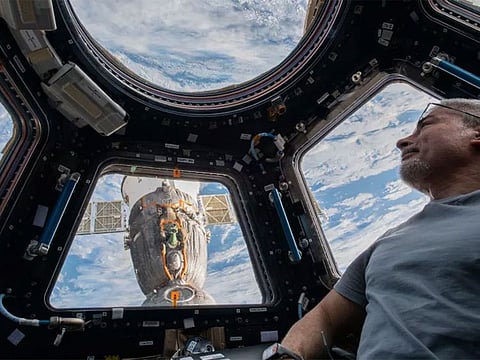Watch: US astronaut, 2 Russian cosmonauts return to Earth on shared Soyuz ride
The Soyuz capsule undocked from the ISS and is set to make a landing in Kazakhstan

A US astronaut and two Russian cosmonauts left the International Space Station (ISS) together on a Soyuz capsule as they headed back to Earth on Wednesday, despite heightened US-Russian antagonism over the conflict in Ukraine.
The Russian Soyuz capsule carrying NASA's Mark Vande Hei and his cosmonaut peers Anton Shkaplerov and Pyotr Dubrov successfully undocked from the ISS and is set to make a parachute landing in central Kazakhstan at 1128 GMT, according to Russian space agency Roscosmos.
The joint US-Russian return flight from ISS is being closely watched for signs that escalating strife between Moscow and Washington over the Russian attack on Ukraine have spilled over into longtime cooperation in space between the two former Cold War adversaries.
Vande Hei, who at 55 is completing his second ISS mission, will have logged a US space-endurance record of 355 consecutive days in orbit, surpassing the previous 340-day record set by astronaut Scott Kelly in 2016, according to NASA.
The all-time record for longest single stay in space was set by Russian cosmonaut Valeri Polyakov who spent more than 14 months aboard the Mir space station, returning to Earth in 1995.
Dubrov, 40, who launched to the ISS with Vande Hei last April from the Baikonur Cosmodrome in Kazakhstan, will be completing his first spaceflight, sharing 5,680 Earth orbits and more than 150 million miles in space with Vande Hei, NASA said.
Shkaplerov, 50, just ending his rotation as the latest ISS commander, is a veteran of four missions to the orbital outpost, accumulating 708 total days in space, far exceeding Vande Hei's 523-day career tally, according to NASA. Shkaplerov began his latest space station stint last October.
Space relations tested
Announcing US economic sanctions against Russian President Vladimir Putin's government on Feb. 24, US President Joe Biden ordered high-tech export restrictions against Russia that he said were designed to "degrade" its aerospace industry, including its space program.
Dmitry Rogozin, director-general of Roscosmos, then lashed out in a series of Twitter posts suggesting the US sanctions could "destroy" ISS teamwork and lead to the space station falling out of orbit.
The following week, state-run Russian news agency RIA Novosti posted a video spoof depicting cosmonauts waving farewell to Vande Hei before Russia's ISS module detaches from the space station and flies away without him to the applause of Russian officials at mission control, leaving the rest of the station sinking lower in orbit.
The clip, described by RIA Novosti as "comic," plays out to the Russian-language love ballad "Goodbye," by Russian vocalist Lev Leshchenko.
At about the same time, Rogozin announced that Russia would stop supplying or servicing Russian-made rocket engines used by two U.S. aerospace NASA suppliers, suggesting U.S. astronauts could use "broomsticks" to get to orbit.
NASA, for its part, has said that U.S. and Russian ISS crew members were well aware of events on Earth but are working professionally together without tension.
The three returning ISS crew were replaced on the space station by three cosmonauts who flew to orbit on March 18, joining the three remaining US colleagues of Vande Hei and a German astronaut from the European Space Agency.
Russia's space agency later dismissed Western media reports suggesting the newly arrived Russian cosmonauts had chosen to wear yellow flight suits with blue trim - the colors of Ukraine's national flag, in support of Ukraine. They were greeted warmly, with hugs and handshakes.
"Sometimes yellow is just yellow," Roscosmos's press service said on its Telegram channel.



